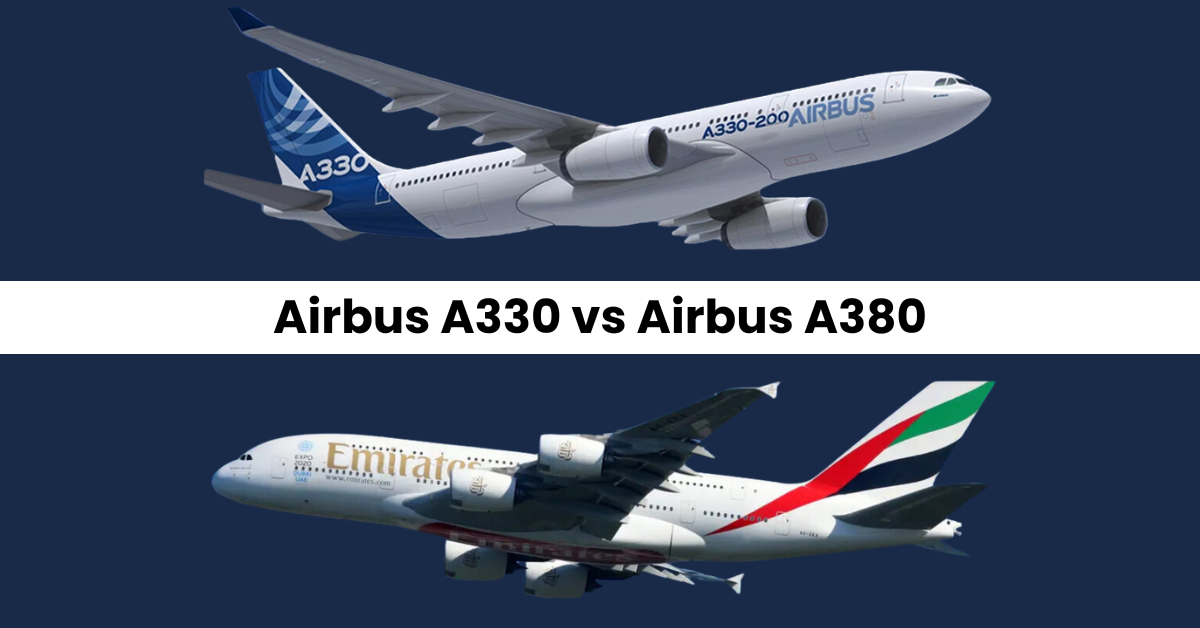The Airbus A330 vs A380 cater to different segments of air travel: the A330 is known for its efficiency on medium to long-haul flights, while the A380, the world’s largest passenger airliner, excels in high-capacity, long-haul journeys. This comparison highlights Airbus’s versatility in meeting diverse airline needs – the A330’s operational cost-effectiveness and the A380’s unmatched passenger capacity.
Airbus A330 vs A380

The Airbus A330 vs A380 are like two stars in the Airbus lineup, each shining in its own way. The A330 is perfect for flying a lot of people over medium to long distances, holding between 260 to 460 passengers. It’s known for being cost-effective and flexible, making it a go-to choice for many airlines. Then there’s the Airbus A380, the giant of the skies and the biggest passenger plane around. It can carry 555 people, making it ideal for really long flights packed with passengers. It’s super big, with a length of 73 meters and a wingspan of about 80 meters, and it can carry a lot of fuel, which means it can fly really far without stopping. So, in a nutshell, the A330 is great for its efficiency and range, while the A380 is all about carrying lots of people a long way in comfort.
| Specification | Airbus A330 | Airbus A380 |
|---|---|---|
| Typical Seating | 260-300 (3-class), 460 (Economy) | 555 passengers |
| Average Price | Varies by variant | US$375.3 Million |
| Flight Crew | Not specified | 2 |
| Length | 63.66 meters | 73 meters |
| Height | 16.79 meters | 24.1 meters |
| Fuselage Diameter | 5.64 meters | 7.14 meters |
| Cabin Length | 50.36 meters | 50.68 meters |
| Max Cabin Width | 5.26 meters | Main Deck: 6.58 meters, Upper Deck: 5.92 meters |
| Wing Span | 64 meters | 79.8 meters |
| Ramp Weight | 251.90 tonnes | 619.49 tonnes |
| Take-off Weight | 251.00 tonnes | 617.29 tonnes |
| Landing Weight | 191.0 tonnes | 425.49 tonnes |
| Zero Fuel Weight | 181.00 tonnes | 397.93 tonnes |
| Operating Empty Weight | Not specified | 305.34 tonnes |
| Engines | Electric CF6-80E1 or Whitney PW4164/8 or Rolls-Royce Trent 700 | Rolls-Royce Trent 900 or Engine Alliance GP-7200 |
| Range | 13,334 km | 15,000 km |
| Operating Speed | Mach 0.86 | Mach 0.89 |
| Service Ceiling | Not specified | 43,000 feet (13,100m) |
| Freight Volume | Not specified | 171 Cubic Meters |
| Volume of Pallets | 9 + 5 LD3 | Under Floor 13 Pallets |
| Container Capacity | 33 LD3 underfloor | Underfloor 38 LD3 containers |
| Fuel Capacity | 139,090 liters | 320,000 liters |
Airbus A330


The Airbus A330 is like a Swiss Army knife of airplanes, first hitting the skies in 1992. It’s really good at handling all sorts of flights, whether they’re short trips or long journeys across the world. This family of planes has a few different types, each made for specific flying needs. The A330-200, which started flying in 1998, is great for really long flights because it goes far without needing to stop. The A330-300, the first one made, is a crowd-pleaser for busy routes because it can carry lots of passengers. Then there’s the latest A330neo series, including the A330-800neo and A330-900neo, introduced in 2014. These new kids on the block are even better because they use less fuel and are kinder to the environment.
Airbus A380


Imagine the biggest passenger plane you can, and you’ve got the Airbus A380, which first soared into the air in 2005. It’s huge, like a flying hotel, and is known as the ‘Superjumbo.’ It’s so big that it can fit 555 people in a typical setup. The A380-800, the only model you can buy, is a favorite for flights that are packed and go really far. Its two floors make it feel more spacious and comfy for passengers. Plus, even though it’s massive, it doesn’t guzzle fuel like you’d think, all thanks to its smart engine design. Big airlines love this plane for their fanciest international routes, as it stands for luxury and cutting-edge flying technology.
Airbus A330 vs A380 Engines
The Airbus A330 and A380 have engines tailored for their specific needs. The A330 uses engines like the Rolls-Royce Trent 700 and Trent 7000, which are efficient and great for long flights without using too much fuel. The larger A380 needs more power for its size and passenger capacity, so it uses either the Rolls-Royce Trent 900 or the Engine Alliance GP7200 engines, providing the strength needed for its long-haul journeys. Essentially, the A330’s engines focus on efficiency, while the A380’s are all about high power and long-distance capability.
Airbus A330 Engine
The A330neo is powered by the latest Rolls-Royce Trent 7000 engines, offering significant improvements in fuel efficiency and noise reduction. These engines provide a thrust range between 68,000 to 72,000 pounds, supporting the aircraft’s extended range and payload capabilities.
Airbus A380 Engine
The A380 uses either the Rolls-Royce Trent 900 or the Engine Alliance GP7200 engines. These powerful engines, with a thrust range of 70,000 to 84,000 pounds, enable the A380 to cover long distances with a full passenger load efficiently.
Airbus A330 vs A380 Fuel Comparison
When we compare the fuel use of the Airbus A330 vs A380, it’s like looking at two different ways of using energy. The A330 is known for being really good with fuel. It doesn’t need as much to fly far, which makes it a smart choice for airlines that want to save on fuel costs, especially with the newer A330neo models. The A380, because it’s a much bigger plane, uses more fuel. But for its size and the number of people it can carry, it’s actually pretty good at not wasting fuel. So, the A330 is great for using less fuel on a variety of flights, while the A380, even though it uses more fuel, is efficient in its own way for really long trips with lots of passengers.
Airbus A330 Fuel Capacity & Average
The Airbus A330 is really good when it comes to saving fuel, making it a smart choice for airlines. This plane can hold up to 139,090 liters of fuel, which lets it fly long distances without needing to stop for more gas. Talking about how much fuel it uses, the Airbus A330-200E version uses about 5.2 tons of fuel every hour when flying at 870 km/h high up at 30,000 feet. The A330-300E model is a bit thirstier, using around 5.46 tons of fuel per hour. But the newer models, the A330-800neo and A330-900neo, are even better at saving fuel. They use around 4.8 and 5.2 tons per hour, respectively.
This means that flying an A330 costs between $6,862.05 and $7,188.00 each hour. One of the coolest things about the A330 is that it only burns about 2.6 gallons of fuel per mile, which is pretty impressive for a big plane like this. So, the A330 is not only great for long trips but also helps airlines save money on fuel.
Airbus A380 Fuel Capacity & Average
The Airbus A380 is really something special – it’s the biggest plane for passengers out there. It can carry a whopping 320,000 liters of fuel in its 11 tanks. That’s like 250 tons! This huge amount of fuel means the A380 can fly really long distances without stopping. Despite being so big, it’s surprisingly good with fuel. Airbus says it uses less than 3 liters for every 100 kilometers each passenger travels, which works out to about 78 miles per gallon for each person. On a typical flight, the A380 uses around 4,600 gallons (that’s 17,400 liters) of fuel each hour.
Also, the A380 is doing its part for the planet. It was tested using a type of fuel that’s better for the environment, called Sustainable Aviation Fuel (SAF), in one of its engines. This test shows that Airbus is serious about making flying more eco-friendly. So, the A380 isn’t just huge and good at saving fuel; it’s also part of the push to make flying kinder to the environment.
Airbus A330 vs A380 Performance and Range
| Specification | Airbus A330 | Airbus A380 |
|---|---|---|
| Range | 13,334 km | 15,000 km |
| Max Cruise Speed | Mach 0.86 | Mach 0.89 |
| Service Ceiling | 41,450 feet | 43,000 feet |
The A330 and A380 both offer impressive performance and range capabilities. The A330 is suited for a variety of routes, from short-haul to long-haul, while the A380 is specifically designed for ultra-long-haul routes.
Airbus A330 vs A380 Dimensions
| Specification | Airbus A330 | Airbus A380 |
|---|---|---|
| Overall Length | 63.66 meters | 73 meters |
| Height | 16.79 meters | 24.1 meters |
| Wingspan | 64 meters | 79.8 meters |
The A380 stands out with its larger dimensions, designed to accommodate more passengers and provide unparalleled comfort.
Airbus A330 vs A380 Capacity
| Specification | Airbus A330 | Airbus A380 |
|---|---|---|
| Maximum Seating | 460 | 555 |
| Typical 3-class | 260-300 |
Airbus A330 vs A380 Pricing
| Aircraft | Average Price |
|---|---|
| Airbus A330 | Varies by variant |
| Airbus A380 | $375.3 million |
The A330 offers various pricing options depending on the variant, while the A380 comes with a higher price tag, reflecting its larger size and capacity.
Conclusion
In summary, the Airbus A330 vs A380 each excel in their respective roles in the aviation industry. The A330 stands out for its fuel efficiency and versatility, ideal for a range of flight lengths, while the A380 impresses with its immense passenger capacity and comfort for long journeys. Both models reflect Airbus’s commitment to innovative, efficient, and environmentally conscious aviation, catering to diverse airline needs and solidifying their status as remarkable achievements in modern aircraft design.
FAQs
What are the main differences between the Airbus A330 and A380?
The Airbus A330 is known for its efficiency and versatility, ideal for medium to long-haul flights, while the A380, being the world’s largest passenger airliner, is designed for high-capacity, long-haul flights.
How fuel-efficient is the Airbus A330?
The Airbus A330 is highly fuel-efficient, using about 2.6 gallons of fuel per mile, making it a cost-effective option for airlines.
What is the passenger capacity of the Airbus A380?
The Airbus A380 can typically seat up to 555 passengers in a standard three-class layout.
How does the Airbus A380 contribute to sustainable aviation?
The Airbus A380 has been tested using 100% Sustainable Aviation Fuel (SAF) in one of its engines, demonstrating Airbus’ efforts towards environmentally sustainable air travel.
What kind of routes are best suited for the Airbus A330 and A380?
The Airbus A330 is best suited for a variety of routes, including medium and long-haul, while the A380 is ideal for high-capacity, long-haul international routes.
Are there different variants of the Airbus A330 and A380?
Yes, the Airbus A330 has several variants, including the A330-200, A330-300, and the newer A330neo models. The A380 has the primary commercial variant, the A380-800.

